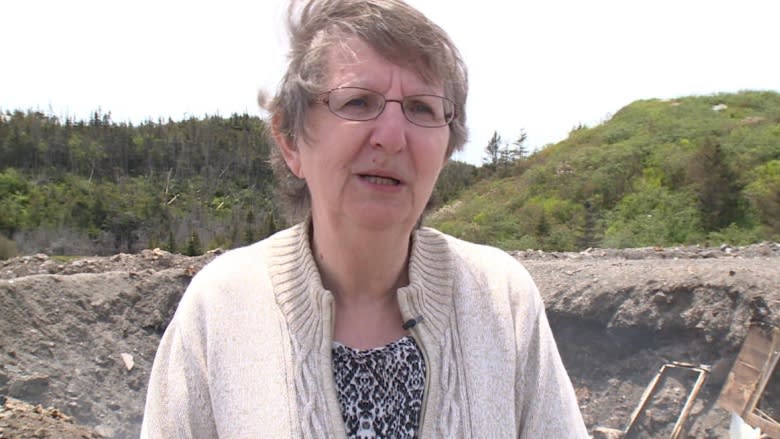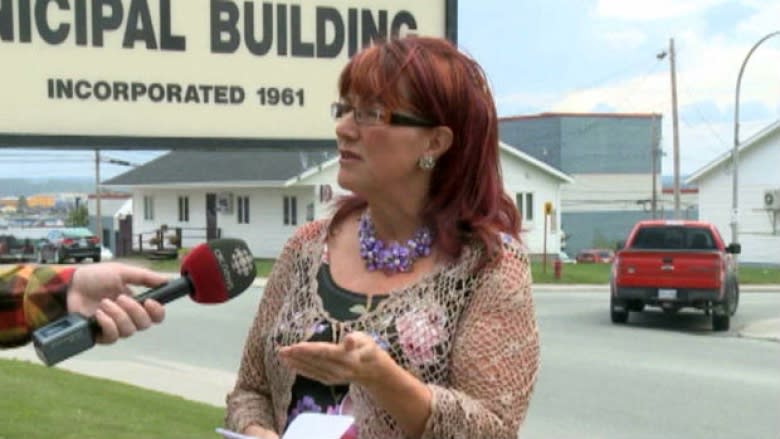Rural communities to feel sting in hard-hitting budget
The pocketbook pain is sure to be felt province-wide, but rural Newfoundland and Labrador was hit hard in Thursday's budget.
The mix of fees and closures that were announced on Thursday — from gas taxes to ferry fees to courthouse closures — will have a particular impact on residents living off the Avalon Peninsula.
Among the province-wide tax increases were a number of measures that will increase the cost of living outside a city or large town.
The temporary gas tax alone – an extra 16.5 cents a litre, starting on June 2 – will be a sting for those who have to drive to access services.
The budget also affects those services, with closures of courthouses and government offices.
Ferry users will be paying more, and even simple pleasures like hunting, fishing and camping will be more expensive.
Burgeo Mayor Barbara Barter says the measures will have a big impact in rural parts of the province, where she added incomes tend to be lower and spare dollars harder to come by.
"When you look at a base salary for communities like Burgeo, they are middle-class wage earners. You're not going to get your six or seven-figure salaries," Barter said.
"If you have someone who is living on a $36,000 salary, having to pay somewhere between $300-450 (for the deficit reduction levy) — that's a lot of money."
Getting around
As part of the Liberal government's wide-ranging changes, geared to tame a $1.83-billion deficit, a number of transportation-related fees will be increased.
The province's gas tax is set to double, moving from 16.5 cents to 33 cents per litre.
Taxes will then represent about 30 per cent of the price of each litre of fuel – a cost that will make filling up less pleasant before a long drive.
"If you're living in a place like Burgeo, you have to drive almost two hours before you get to the Trans-Canada," Barter said.
"That increase in fuel [taxes] is certainly not going to help community members with their budget."
It's even worse for residents on Ramea, who first have to take a ferry.
That's because provincial ferry fees also increased in this budget, an average of $1.75 per trip.
The budget also cut money from the medical transportation benefit, and will eliminate lunchtime busing in 19 communities around the province.
Courthouses closed
Cost-saving measures will claim two provincial courts, in Wabush and Harbour Grace, a decision the St. John's Status of Women Council puts safety at risk.
"We know that in rural communities, there's double the rates of domestic violence that there are in the city," said executive director Jenny Wright.
"Taking away a courthouse ... where women are able to see some kind of justice, get charges laid, get protection orders in place and have sheriffs that will be able to monitor their safety in some way — that takes all that away from rural communities," Wright said.
Wright said that she understood the province's fiscal crisis, but said the courts were too important to have closed down.
"Without supports and services around domestic violence, women die," she said.
"This is a human rights issue for women."
Justice Minister Andrew Parsons said while the details are not all worked out, his government is working to maintain services to people in rural Newfoundland.
He said the government is still working on expanding the family violence intervention courts, and is also talking about establishing circuit courts where full-time courts were cut. Circuit courts involve travelling judges who hear cases in other communities.
"Wabush, prior to 2007, had been a circuit court for almost 20 years," said Parsons.
"There's a cost savings that needs to be realized, but we're talking about circuits. These are things that are being worked out with the judiciary."
He also insisted that there would be no changes to policing, despite some cuts to the Royal Newfoundland Constabulary and the RCMP.
"The public safety side — that hasn't been affected."
Infrastructure projects cut, but formula spared
Ten infrastructure projects were deferred or cancelled, falling to the government axe in the budget on Thursday.
The Goulds bypass road, a medical laboratory program in Grand Falls-Windsor, and the dementia-care home for Burin were all canned, saving the government an estimated $26-million.
Despite the cuts, Municipalities Newfoundland and Labrador president Karen Oldford said she was happy that the province maintained much of the infrastructure funding in the province, and the split provincial/municipal funding formula.
"Probably not as much as what you would have liked, but yes, there's still infrastructure funding coming," said Oldford, who is also the mayor of Labrador City.
"That infrastructure funding will create close to a thousand jobs in four years."
Oldford said a lot of the infrastructure needs in the province are in rural areas, and it's important that those are addressed if the community is going to be able to retain residents into the future.
"We have communities that don't have safe clean drinking water right now in our province," she said.
The province did continue funding for the Trans-Labrador Highway and the Western Memorial Regional Hospital.
Fees and fines
Along with the ferry charges, a number of fees were hiked that will directly affect rural residents and travellers.
The government has introduced entry fees for the previously free Cape St. Mary's Ecological Reserve – $25 per family – and tour fees for Mistaken Point.
The province has created a charge for commercial water use and fishing licences, which are up about $5, and introduced a tax on clam and snow crab processing – up to $5.50 a tonne.
Registration for snowmobiles, ATVs and trailers has also become more expensive.
A shared burden, minister claims
When asked, Parsons, who represents Burgeo-La Poile in the House of Assembly, wouldn't directly say whether he believed the government's budget impacted rural and urban communities proportionally.
"I think it's going to have, certainly, an effect on a number of people," he said.
"Rural, urban, seniors, young people. It all depends on your circumstances."
The office of Christopher Mitchelmore, the minister responsible for rural development, did not respond to requests for an interview.
Parsons repeated the government's stance on the budget, saying the province was in a dire fiscal mess and action needed to be taken.
"It's going to have effects on people throughout the province, but it's what we felt was necessary in order to get us back and put us on track."





